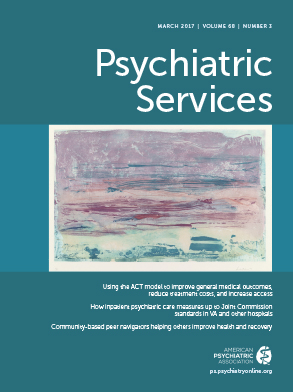TO THE EDITOR: Gören and colleagues (
1) concluded that the Veterans’ Health Administration (VHA) could save upwards of $290 million per year by initiating clozapine treatment for all patients with treatment-refractory schizophrenia. This conclusion is crucially based on estimated cost savings of over $22,000 per veteran in the first year of clozapine therapy. These savings are attributed to decreased inpatient hospital days—estimated at 18.6 fewer days per patient. We appreciate the comprehensiveness of this decision analysis but doubt the validity of the projected inpatient savings on which the conclusion depends.
First, of the seven studies on which the inpatient estimate was based, all but one were pre-post mirror image studies. The decrease in inpatient days observed in these studies most likely reflects regression to the mean and in the absence of an equivalent control group cannot be attributed to causal effects of clozapine. The one randomized trial included in the analysis, conducted in the VHA two decades ago, included only patients who had been hospitalized for more than 30 days in the year preceding randomization (
2). In our analysis of 2015 VHA data, only 3% of 86,000 patients diagnosed as having schizophrenia in the VHA spent more than 30 bed days in hospital psychiatric units. Further, using Gören and colleagues’ estimate that 20% of patients with schizophrenia diagnoses are “treatment refractory,” only 16% of the refractory patients could have spent more than 30 days in the hospital, and at least 35% of them would not have been hospitalized, and thus there would be no chance of any inpatient savings. The business case applies, at most, to only 16% of the treatment-refractory population which it is meant to address.
Second, the only other randomized trial of the impact of clozapine on hospital days, a study of long-term state hospital inpatients, reported no significant decrease in hospital utilization (
3). In addition, a retrospective analysis of three-year VHA inpatient data reported
increased inpatient days for patients started on clozapine compared with a carefully matched control group, given that these data also included patients started on clozapine who later dropped out from treatment (
4).
Finally, a recent large observational study using Medicaid data reported a 5% attributable risk reduction (from 36.4% to 31.4%) in the likelihood of hospitalization among treatment-refractory patients started on clozapine compared with a propensity score–matched control group (
5). If this 5% reduction is applied to the average annual psychiatric bed days of care among patients with schizophrenia in the VHA in 2015 (31 days), the reduction of inpatient days due to use of clozapine would be estimated at only 1.6 days.
We agree that an updated evaluation of the cost-effectiveness of clozapine is needed, one that is based on current generic drug and blood-monitoring costs, a generalizable current estimate of inpatient savings, and a meta-analysis of clozapine effectiveness and side effects. Based on our critical review of literature and recent VHA data, the business case for clozapine is far weaker than the one presented.

